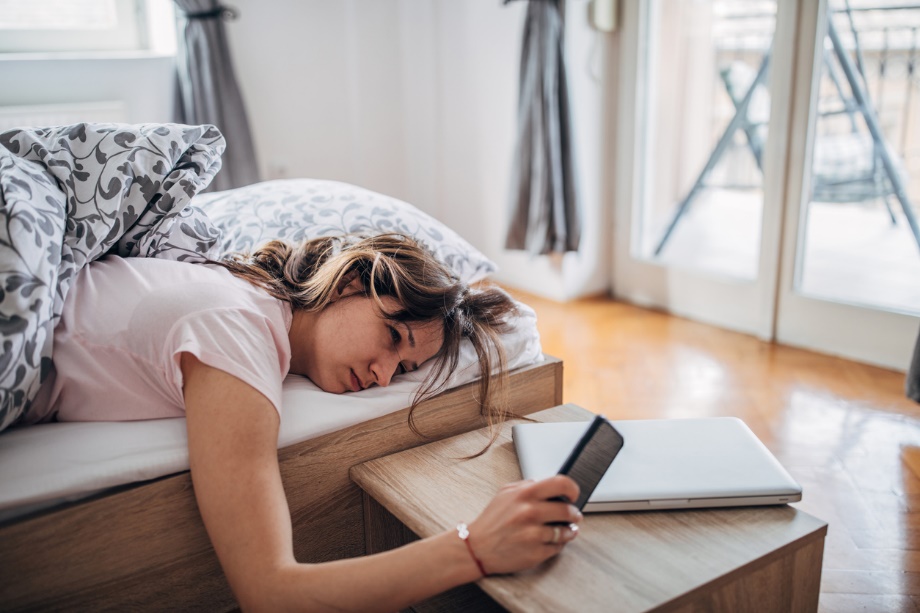Is Social Jet Lag Dragging You Down?
Social jet lag refers to the mismatch between a person’s internal clock and their daily schedules. For most people that means the difference in sleep schedules between weekdays (school or workdays) and weekends (non-workdays).
There is much research showing a variety of health and mental health problems associated with a lack of sleep. There is emerging research that social jet lag, a difference in the timing of sleep rather than the overall amount, also has a detrimental impact on health. Social jet lag is typically measured as the midpoint of sleep on free days minus the midpoint of sleep on workdays. So, for example, a person sleeping midnight to 8 a.m. on weekends (midpoint 4 a.m.) and 11 p.m. to 5 a.m. on weekdays (midpoint 2 a.m.) would have a 2-hour social jet lag.
 People normally vary in sleep timing preferences, with many people considering themselves a ‘morning person’ or a ‘night person.’ This is referred to as a person’s chronotype, a reflection of their individual circadian rhythm. Genetics and environment influence your sleep timing preferences. Sleep preferences also change with age—young children and older adults more likely to be early risers.
People normally vary in sleep timing preferences, with many people considering themselves a ‘morning person’ or a ‘night person.’ This is referred to as a person’s chronotype, a reflection of their individual circadian rhythm. Genetics and environment influence your sleep timing preferences. Sleep preferences also change with age—young children and older adults more likely to be early risers.
Societal schedules tend to favor people who go to sleep and wake up earlier. People with biological clocks on a later timeframe are more likely to experience social jet lag and need to make greater adjustments.
 One recent study found that the chronic changes in sleep wake patterns due to social constraints (having to get up earlier on workdays) are associated with less restorative sleep and lower sleep quality. Another study highlights psychiatric problems associated with the different weekday and weekend sleep schedules, including aggression and conduct problems, mood disorders, and cognitive impairment (work and academic problems). The study also found increased cardiometabolic risk.
One recent study found that the chronic changes in sleep wake patterns due to social constraints (having to get up earlier on workdays) are associated with less restorative sleep and lower sleep quality. Another study highlights psychiatric problems associated with the different weekday and weekend sleep schedules, including aggression and conduct problems, mood disorders, and cognitive impairment (work and academic problems). The study also found increased cardiometabolic risk.
A study of adults age 18 to 65 living in rural areas and a study of Japanese workers both found an association between greater social jet lag and an increased likelihood of having depressive symptoms. A study looking at young adults found significant association between social jetlag and depression among women in northern regions of the world.
Researchers suggest some individual strategies, such as increasing morning light exposure and decreasing evening light exposure, to help shift the biological clock to an earlier phase and lessen social jet lag. You can also adjust the light on your electronic devices to a night light setting. This decreases blue light which can keep you awake.
When changes in a person’s sleep timing leads to more extreme, ongoing disturbed sleep and problems functioning, a person may be diagnosed with a circadian rhythm sleep disorder.
References
- Study, AR, et al. Association of Social Jetlag with Sleep Quality and Autonomic Cardiac Control During Sleep in Young Healthy Me. Frontiers in Neuroscience. Sept. 2019. Vol 13, article 950.
- Beauvalet, JC, eta l Social jetlag in health and behavioral research: a systematic review. ChronoPhysiology and Therapy. 2017:7, 19-31.
- Islam, A. et al. Social jetlag is associated with an increased likelihood of having depressive symptoms among the Japanese working population: the Furukawa Nutrition and Health Study. Sleep. Sept. 2019.
- Henderson, SEM Brady, EM, Robertson, M. Association between social jetlag and mental health in young people; a Systematic review. Chronobiol Int. Oct. 2019, 36(10):1316-1333.
